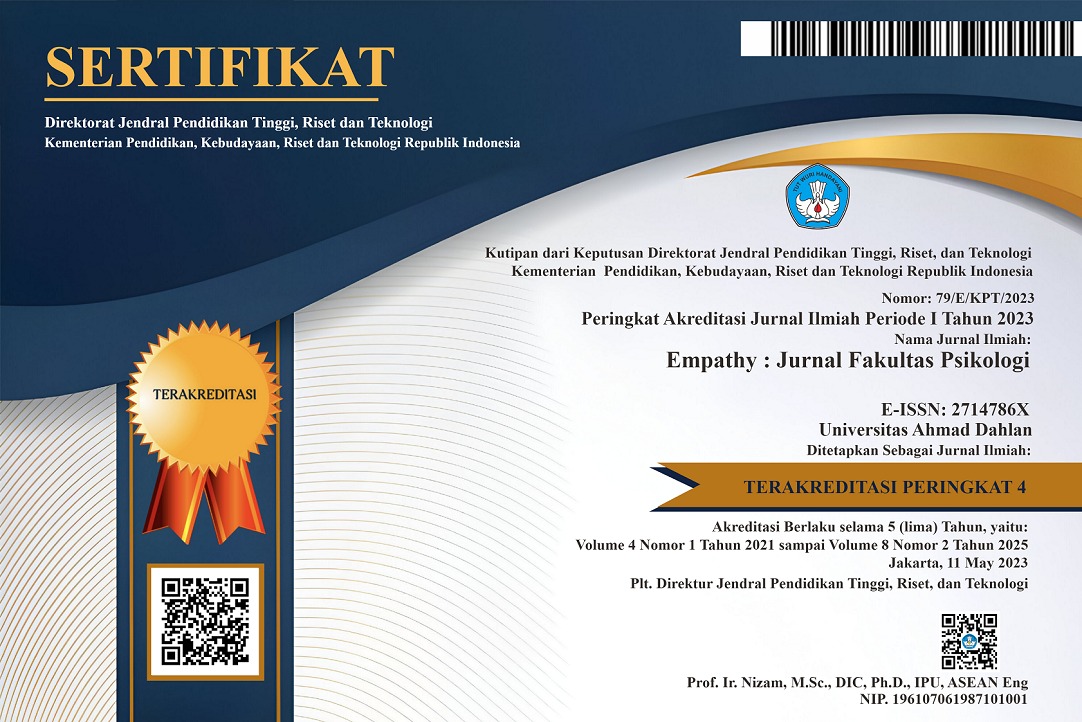REGULASI EMOSI PADA PENDERITA HIV/AIDS
DOI:
https://doi.org/10.12928/empathy.v3i1.3011Abstract
Penelitian ini bertujuan untuk mengetahui regulasi emosi penderita HIV/AIDS dan faktor-faktor yang mempengaruhi regulasi emosi pada penderita HIV/AIDS. Penelitian ini menggunakan metode kualitatif dengan pendekatan studi kasus. Teknik pengumpulan data menggunakan wawancara dan observasi kepada subjek penderita HIV/AIDS. Subjek penelitian terdiri dari dua orang penderita HIV/AIDS dengan dua orang significant person. Hasil penelitian menunjukkan regulasi emosi dilakukan oleh kedua subjek untuk mengatur respon emosi dari permasalahan yang muncul setelah kedua subjek terinfeksi HIV/AIDS. Subjek pertama yang merupakan seorang wanita yang telah menikah, menggunakan strategi regulasi emosi antecendent-focussed strategy (cognitive reapraissal). Melalui proses regulasi emosi yang terdiri dari situation selection, situation modification, attention deployment, cognitive change, dan modulation respon. Faktor yang mempengaruhi penggunaan regulasi emosi subjek pertama yakni harapan akan masa depan anak, keterbukaan (self disclosure) dan dukungan sosial (sosial support). Subjek kedua yang merupakan pria yang belum menikah, meregulasi emosi dengan menggunakan strategi regulasi emosi respon focused strategy (expression suppression) melalui proses regulasi emosi situation selection. Penggunaan strategi regulasi emosi ini dipengaruhi faktor ketidakmampuan membuka diri dan dukungan sosial (sosial support). Kesimpulan dari penelitian ini adalah kedua subjek meregulasi emosi dengan pemilihan strategi regulasi emosi yang berbeda. Faktor yang paling mempengaruhi penggunaan regulasi emosi penderita HIV/AIDS adalah dukungan sosial (sosial Support).
Kata Kunci : Pengidap HIV/AIDS, regulasi emosi
Downloads
Issue
Section
License
Authors who publish with Empathy: Jurnal Fakultas Psikologi agree to the following terms:
- Authors retain copyright and grant the journal right of first publication with the work simultaneously licensed under a Creative Commons Attribution License (CC BY-SA 4.0) that allows others to share the work with an acknowledgment of the work's authorship and initial publication in this journal.
- Authors are able to enter into separate, additional contractual arrangements for the non-exclusive distribution of the journal's published version of the work (e.g., post it to an institutional repository or publish it in a book), with an acknowledgment of its initial publication in this journal.
- Authors are permitted and encouraged to post their work online (e.g., in institutional repositories or on their website) prior to and during the submission process, as it can lead to productive exchanges, as well as earlier and greater citation of published work.

This work is licensed under a Creative Commons Attribution-ShareAlike 4.0 International License.



